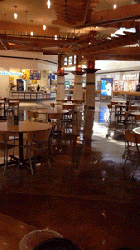DEARBORN — Shortly after the holidays, waves of unbearable cold and snow headed toward our region from the Arctic North. Sunday’s snowfall, followed by the “polar vortex” of arctic wind, froze most aspects of life in the Midwest. Schools closed, meetings were called off, flights were canceled and cars hardly started.
In Dearborn, like most places that fell under the impact of the snow, local businesses suffered from the prolonged freezing weather, which started Sunday and dragged until Thursday, bringing about some of the coldest days in decades.
“There is nobody here. The mall should not be open. It’s pointless,” said Randa Baydoun, who works at a coffee shop in Fairlane Town Center.
She said the mall was scarcely busy on Tuesday because of the cold, even though it had stopped snowing.
A manager at a cosmetic store at Fairlane said there was “hardly any business” at the mall from Sunday to Tuesday.
“It was like a ghost town. Some stores, including chains, did not open Monday. We closed early,” he said. “Who would leave their house to shop in such weather? It took me an hour to get the car out of the driveway.”
The manager estimated the losses for his shop in the thousands of dollars. “Multiply that by 130 stores in the mall,” he said.
Dearborn is a magnet for diners and entertainment seekers. But the city’s dozens of cafes, restaurants and hookah bars were hit hard by the subzero temperatures.

|
| Fairlane Mall’s food court was empty during the snow emergency. |
Aymen Taleb, the manager of Sky Lounge, a hookah bar and restaurant in east Dearborn, said business dropped by more than half during the storm.
“People are not leaving their homes. They are scared of driving and going out. Monday, business was almost 70 percent less than usual, same for Sunday,” he said.
Taleb added that the cafe started getting more customers on Tuesday, even though a couple of local businesses, which Sky Lounge caters for, canceled their lunch orders because employees could not make it to work.
He said the City is doing what it can to keep the roads clean, but there is “too much snow.”
“Maybe the snow this year is more than expected,” Taleb said. “But for people to feel safe, the roads need to be cleaned several times.”
Grocery stores in the city experienced a brief boom on Saturday, Jan. 4, as people rushed to stock food in their homes before the forecasted snowfall.
Long lines of filled shopping carts could be seen at small and corporate grocery stores in the area on Saturday.
Kamal Turfe, the co-owner of Dearborn Fresh, said some people were “worried,” so they hurried to the store and bought everything they could before Sunday’s anticipated snow storm.
However, he added that business did not drop drastically during the severe weather.
“It was not busy as usual, but believe it or not, it wasn’t that bad on Monday,” he said.”Our people are fearless, I guess. If they can live next to wars [in the Middle East], they can come out during a storm.”
Turfe said that the storm caused a “very good boost” for business overall.
Dr. Warren Anderson, an assistant professor of economics at the University of Michigan-Dearborn, said the severe weather will not have a significant long term effect on the economy.
“I don’t think it should affect the economy that much. In the short run, it could have some negative effects on individual businesses. But soon the economy will be back to normal,” he said. “Overall, it wouldn’t matter that much.”
Anderson added that the weather will cause a “shift of consumption,” without majorly changing the amount of consumption.
“If you were planning to buy movie tickets and you could not go out because of the weather, you might still go to the movies when it gets warmer,” he explained.
He said the same idea applies to excess amounts of food bought before the storm. People will purchase less food in the next week, evening out the consumption rate.
“If the food holds, you will not buy more groceries after the storm. Instead of spreading your consumption over a couple of weeks, you’re buying more food at once. Consumption does not change on the whole,” Anderson said.






Leave a Reply